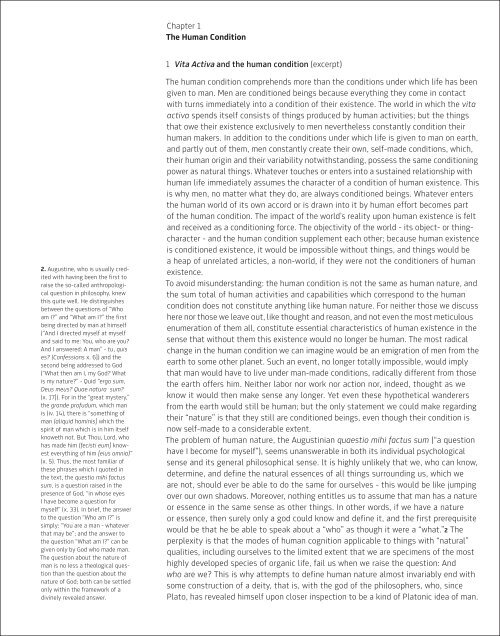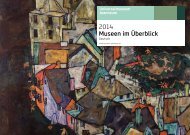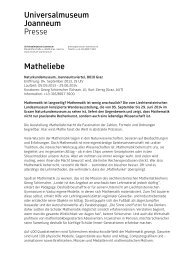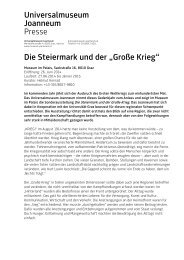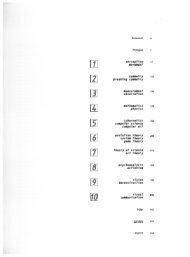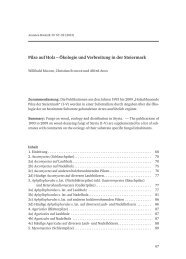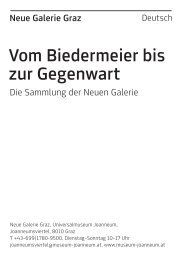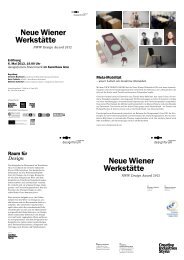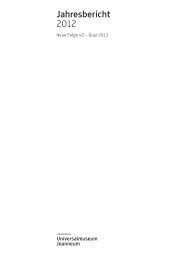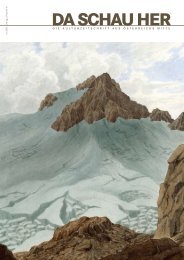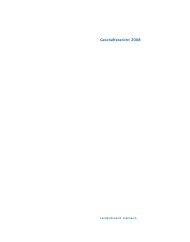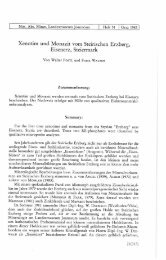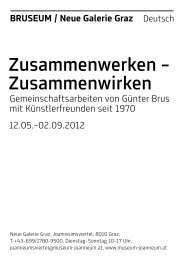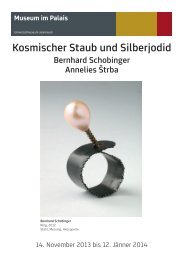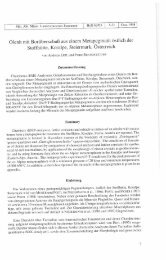Human Condition - Universalmuseum Joanneum
Human Condition - Universalmuseum Joanneum
Human Condition - Universalmuseum Joanneum
Erfolgreiche ePaper selbst erstellen
Machen Sie aus Ihren PDF Publikationen ein blätterbares Flipbook mit unserer einzigartigen Google optimierten e-Paper Software.
2. Augustine, who is usually credited<br />
with having been the first to<br />
raise the so-called anthropological<br />
question in philosophy, knew<br />
this quite weIl. He dis tinguishes<br />
between the questions of “Who<br />
am I?” and “What am I?” the first<br />
being directed by man at himself<br />
(“And I directed myself at myself<br />
and said to me: You, who are you?<br />
And I answered: A man” - tu, quis<br />
es? (Confessions x. 6]) and the<br />
second being addressed to God<br />
(“What then am I, my God? What<br />
is my nature?” - Quid “ergo sum,<br />
Deus meus? Quae natura sum?<br />
(x. 17]). For in the “great mystery,”<br />
the grande profudum, which man<br />
is (iv. 14), there is “some thing of<br />
man (aliquid hominis] which the<br />
spirit of man which is in him itself<br />
knoweth not. But Thou, Lord, who<br />
has made him (fecisti eum] knowest<br />
every thing of him [eius omnia)”<br />
(x. 5). Thus, the most familiar of<br />
these phrases which I quoted in<br />
the text, the questio mihi factus<br />
sum, is a question raised in the<br />
pres ence of God, “in whose eyes<br />
I have become a question for<br />
myself” (x. 33). In brief, the answer<br />
to the question “Who am I?” is<br />
simply: “You are a man - whatever<br />
that may be”; and the answer to<br />
the question “What am I?” can be<br />
given only by God who made man.<br />
The question about the nature of<br />
man is no less a theological question<br />
than the question about the<br />
nature of God; both can be settled<br />
only within the framework of a<br />
divinely revealed answer.<br />
Chapter 1<br />
The <strong>Human</strong> <strong>Condition</strong><br />
1 Vita Activa and the human condition (excerpt)<br />
The human condition comprehends more than the conditions under which life has been<br />
given to man. Men are conditioned beings because everything they come in contact<br />
with turns imme diately into a condition of their existence. The world in which the vita<br />
activa spends itself consists of things produced by human ac tivities; but the things<br />
that owe their existence exclusively to men nevertheless constantly condition their<br />
human makers. In addition to the conditions under which life is given to man on earth,<br />
and partly out of them, men constantly create their own, self-made conditions, which,<br />
their human origin and their variability not withstanding, possess the same conditioning<br />
power as natural things. Whatever touches or enters into a sustained relationship with<br />
human life immediately assumes the character of a condition of human existence. This<br />
is why men, no matter what they do, are always conditioned beings. Whatever enters<br />
the human world of its own accord or is drawn into it by human effort becomes part<br />
of the human condition. The impact of the world’s reality upon human existence is feIt<br />
and received as a conditioning force. The objectivity of the world - its object- or thingcharacter<br />
- and the human condition supplement each other; because human existence<br />
is conditioned existence, it would be impossible without things, and things would be<br />
a heap of unrelated articles, a non-world, if they were not the conditioners of human<br />
existence.<br />
To avoid misunderstanding: the human condition is not the same as human nature, and<br />
the sum total of human activities and capabilities which correspond to the human<br />
condition does not con stitute anything like human nature. For neither those we discuss<br />
here nor those we leave out, like thought and reason, and not even the most meticulous<br />
enumeration of them all, constitute essential characteristics of human existence in the<br />
sense that without them this existence would no longer be human. The most radical<br />
change in the human condition we can imagine would be an emigration of men from the<br />
earth to some other planet. Such an event, no longer totally impossible, would imply<br />
that man would have to live under man-made conditions, radically different from those<br />
the earth offers him. Neither labor nor work nor action nor, indeed, thought as we<br />
know it would then make sense any longer. Yet even these hypothetical wanderers<br />
from the earth would still be human; but the only statement we could make regarding<br />
their “nature” is that they still are conditioned beings, even though their condition is<br />
now self-made to a considerable extent.<br />
The problem of human nature, the Augustinian quaestio mihi factus sum (“a question<br />
have I become for myself”), seems un answerable in both its individual psychological<br />
sense and its gen eral philosophical sense. lt is highly unlikely that we, who can know,<br />
determine, and define the natural essences of all things sur rounding us, which we<br />
are not, should ever be able to do the same for ourselves - this would be like jumping<br />
over our own shadows. Moreover, nothing entitles us to assume that man has a nature<br />
or essence in the same sense as other things. In other words, if we have a nature<br />
or essence, then surely only a god could know and define it, and the first prerequisite<br />
would be that he be able to speak about a “who” as though it were a “what.”2 The<br />
perplexity is that the modes of human cognition applicable to things with “natural”<br />
qualities, including ourselves to the limited extent that we are specimens of the most<br />
highly developed species of organic life, fail us when we raise the question: And<br />
who are we? This is why attempts to define human nature almost invariably end with<br />
some construction of a deity, that is, with the god of the philoso phers, who, since<br />
Plato, has revealed himself upon closer inspec tion to be a kind of Platonic idea of man.


